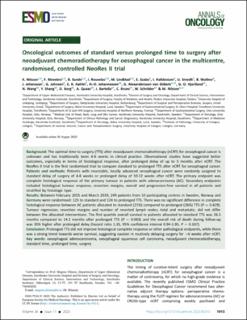Oncological outcomes of standard versus prolonged time to surgery after neoadjuvant chemoradiotherapy for oesophageal cancer in the multicentre, randomised, controlled NeoRes II trial
Nilsson, K.; Klevebro, F.; Sunde, B.; Rouvelas, I.; Lindblad, M.; Szabo, E.; Halldestam, I.; Smedh, U.; Wallner, B.; Johansson, J.; Johnsen, Gjermund; Aahlin, Eirik Kjus; Johannessen, Hans Olaf; Alexandersson von Döbeln, von; Hjortland, Geir Olav; Wang, N.; Shang, Y.; Borg, D.; Quaas, A.; Bartella, I.; Bruns, C.; Schröder, W.; Nilsson, M.
Peer reviewed, Journal article
Published version
Permanent lenke
https://hdl.handle.net/11250/3115660Utgivelsesdato
2023Metadata
Vis full innførselSamlinger
Sammendrag
Background
The optimal time to surgery (TTS) after neoadjuvant chemoradiotherapy (nCRT) for oesophageal cancer is unknown and has traditionally been 4-6 weeks in clinical practice. Observational studies have suggested better outcomes, especially in terms of histological response, after prolonged delay of up to 3 months after nCRT. The NeoRes II trial is the first randomised trial to compare standard to prolonged TTS after nCRT for oesophageal cancer.
Patients and methods
Patients with resectable, locally advanced oesophageal cancer were randomly assigned to standard delay of surgery of 4-6 weeks or prolonged delay of 10-12 weeks after nCRT. The primary endpoint was complete histological response of the primary tumour in patients with adenocarcinoma (AC). Secondary endpoints included histological tumour response, resection margins, overall and progression-free survival in all patients and stratified by histologic type.
Results
Between February 2015 and March 2019, 249 patients from 10 participating centres in Sweden, Norway and Germany were randomised: 125 to standard and 124 to prolonged TTS. There was no significant difference in complete histological response between AC patients allocated to standard (21%) compared to prolonged (26%) TTS (P = 0.429). Tumour regression, resection margins and number of resected lymph nodes, total and metastatic, did not differ between the allocated interventions. The first quartile overall survival in patients allocated to standard TTS was 26.5 months compared to 14.2 months after prolonged TTS (P = 0.003) and the overall risk of death during follow-up was 35% higher after prolonged delay (hazard ratio 1.35, 95% confidence interval 0.94-1.95, P = 0.107).
Conclusion
Prolonged TTS did not improve histological complete response or other pathological endpoints, while there was a strong trend towards worse survival, suggesting caution in routinely delaying surgery for >6 weeks after nCRT.

